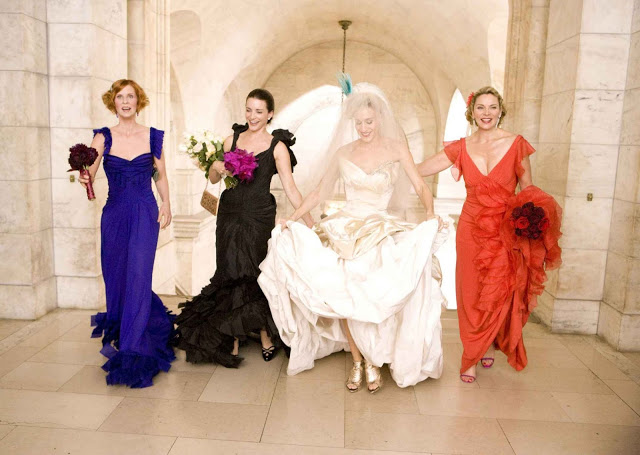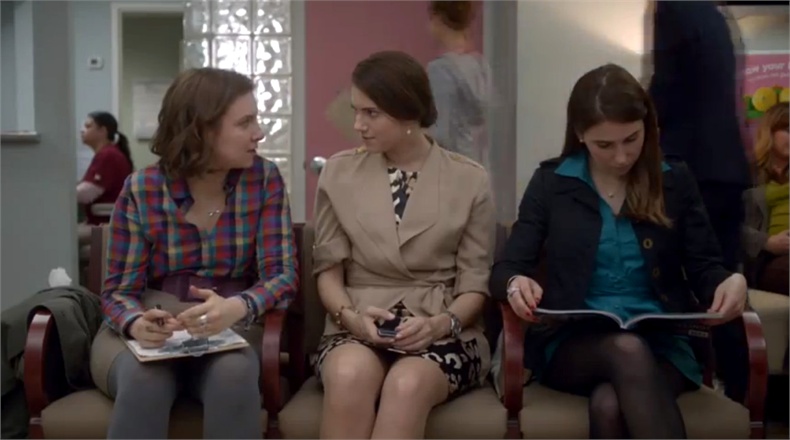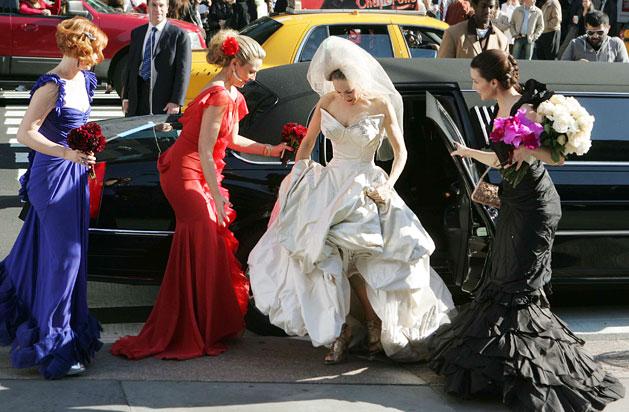For those of us who followed the girls on the hit HBO series, Sex and the City: The Movie, directed by Michael Patrick King, was a hotly anticipated film by the time it was released in 2008. We are familiar with Carrie as an avid writer, a New York fashionista, and an independent woman who consistently shies away from marriage. Certainly, Carrie’s disinterest in marriage throughout the show’s run can be interpreted as feminist by audiences. However, Carrie is quickly swept up in pre-matrimonial hysteria such as her designer dress and guest list. Big tells Carrie repeatedly throughout the film, “I want you,” as opposed to the desire for an extravagant wedding, but this sentiment seems to fall on deaf ears. The underlying message–and it’s a feminist one–seems to be this: smart girls don’t fall in love, smart girls love themselves. We meet Carrie as a woman who is attempting to negotiate these two philosophies, and by the end of the film, Carrie successfully marries Big but also prioritizes herself. In fact, her talk of marriage with Big originates from her drive for self-preservation. In reference to their swanky new apartment, she tells Big, “I want it to be…ours,” rather than his.
 |
|
Carrie marks her territory at “Heaven on Fifth,” as she calls it.
|
“I wouldn’t mind being married to you. Would you mind being married to me?” Big casually questions as the pair prepare dinner. Carrie requests a “really big closet” in lieu of a diamond ring, a somewhat radical move that breaks with tradition as well as the stereotype that many women are “gold diggers” who equate a man’s commitment to the size of the rock he offers her. Rather, Carrie is financially equipped to find and purchase a diamond herself if she decides she’d like one. Carrie neither supports nor challenges the concept of marriage; throughout six seasons of Sex and the City on HBO, Carrie finds that marriage doesn’t suit her and she’d rather not play the role of wife. She tells Samantha, “There’s no cliché, romantic, kneeling on one knee, it’s just two grown-ups making a decision about spending their lives together.” However, Big does kneel down on one knee to formally propose inside “Heaven on Fifth’s” walk-in closet. In this space he builds, Big is “making room” for his bride, and this act of creation is at once romantic and understated. For Carrie, this gift is paramount in Big demonstrating his commitment to her, but hasn’t he already done so in a multitude of other ways?
 |
| Contrary to Charlotte’s engagement party toast, Big remains grounded in reality as Carrie is the one “Carried away.” |
 |
| Charlotte is a spokesperson for the joys and functionality of marriage within a heteronormative lifestyle, complete with the nuclear family by the film’s conclusion. |
 |
| It’s not marriage that can “ruin everything,” but over-the-top weddings: rituals that become more significant than the love, support, and sacrifice they symbolize. |
Bringing the gang on her honeymoon is a decidedly feminist move on Carrie’s part; they are her support system and her surrogate lovers while she and Big are separated. Samantha even spoon-feeds her in bed as Carrie’s being “jilted” at the altar effectively infantilizes her while in Mexico. When audiences observe this pathetic and uncomfortable scene, we are confronted with the notion that, along with Miranda, Samantha has transformed into a maternal character while Carrie grieves. This is undoubtedly the closest Samantha will ever come to motherhood. “Will I ever laugh again?” Carrie asks, and of course, it’s when Charlotte shits her pants. The girls are a reliable source of Carrie’s happiness and stability, a reflection of who she is rather than who she wants to be. Unlike the second movie, in which the gang travels to Abu Dhabi, Samantha is more invested in her friend’s wellbeing than having sex with random men.
 |
| Samantha happily mothers Carrie at her low point, and even winks at her as she stirs her food. |
When Carrie returns from Mexico, she takes on an assistant, and it becomes noticeable that Louise (Jennifer Hudson) is the only black character in the film, a surprising detail given that the setting is New York City. In fact, when searching for a new apartment with her son and nanny, Miranda excitedly says, “Look! White guy with a baby! Wherever he’s going, that’s where we need to be.” Is it me or is this line inextricably offensive? A white man carrying a child is highly symbolic of traditional heteronormative values. Together, these alarming observations render the film both racist and classist. Miranda’s in search of an upscale, and thus white, neighborhood that’s safe for her son.
 |
| The poor colored girl from St. Louis is new to the luxury of owning as opposed to renting. |
On Halloween, Charlotte suggests to her adopted Chinese daughter, Lily, that she can be Mulan for Halloween, but Lily instead chooses to be Cinderella. Even at her young age, Lily embraces whiteness as a beauty ideal and is more stimulated by the glamour of ball gowns and being rescued by a handsome prince than battle armor and the spoils of war. Seemingly, the fantastical princess narrative trumps a feminist warrior’s tale, at least for a girl young enough to still believe in “happily ever after.”
 |
| The laughably mismatched trick-or-treat crew serves as comic relief amidst scenes of loneliness and heartache. |
 |
| The meter is literally running on the pair’s friendship as Miranda’s confrontation of Carrie serves as a reflection of her own personal and marital flaws. |
It is only once Carrie has made peace with Miranda that she can move forward to reconcile with Big. “There is no right time to tell me that you ruined my marriage,” she spits at Miranda on Valentine’s Day. In fact, there is no marriage to destroy since Big failed to show up. However, the marriage and harmonizing of the four friends is climactic within the film’s plot while Carrie’s marriage to Big takes place almost as an afterthought, part of the film’s resolution.
 |
| We are given the elusive image of Carrie barefoot, sans designer stilettos. |










